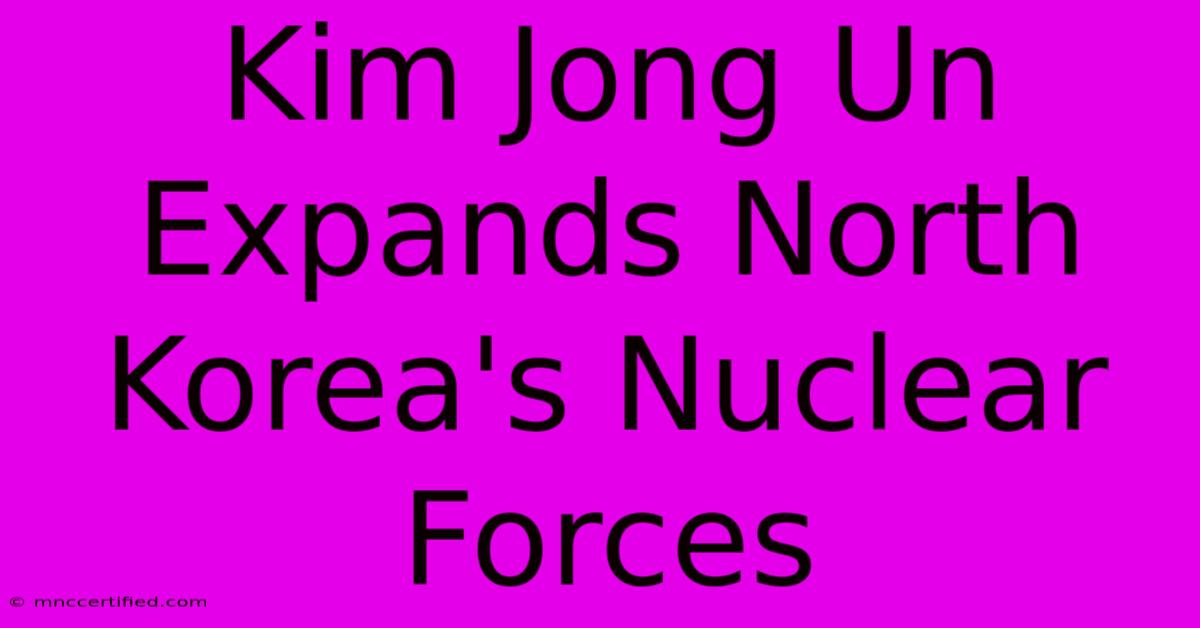Kim Jong Un Expands North Korea's Nuclear Forces

Table of Contents
Kim Jong Un Expands North Korea's Nuclear Forces: A Dangerous Escalation
North Korea's nuclear program has long been a source of international concern, but recent developments under Kim Jong Un's leadership signal a significant and dangerous escalation. This article delves into the expansion of North Korea's nuclear forces, analyzing the implications for regional and global security.
The Expanding Arsenal: A Closer Look at North Korea's Nuclear Capabilities
Kim Jong Un's regime has consistently defied international sanctions and pressure, relentlessly pursuing the development and expansion of its nuclear and ballistic missile capabilities. This expansion is not merely quantitative; it's also qualitative, indicating advancements in weapon technology and delivery systems.
Increased Production of Nuclear Weapons:
Reports suggest a substantial increase in the production of nuclear weapons materials and warheads. This heightened production capacity demonstrates a clear intent to significantly bolster North Korea's nuclear arsenal. Intelligence assessments point to a growing number of fissile materials, indicating a potential for a rapidly expanding stockpile of nuclear warheads.
Advanced Missile Systems:
Beyond the sheer number of weapons, North Korea is also developing increasingly sophisticated delivery systems. The testing of intercontinental ballistic missiles (ICBMs) capable of reaching the continental United States represents a major leap forward in their capabilities. These advancements pose a credible threat to global security, prompting widespread concern among world powers. Furthermore, the development of submarine-launched ballistic missiles (SLBMs) significantly enhances North Korea's ability to launch a surprise attack, making its arsenal harder to neutralize.
Miniaturization and Deployment:
The successful miniaturization of nuclear warheads is another critical development. This allows for the integration of nuclear weapons into a wider range of delivery systems, including shorter-range ballistic missiles and potentially even tactical weapons. This flexibility increases the potential for use and escalates the risk of regional conflict.
The Geopolitical Implications of North Korea's Nuclear Expansion
The expansion of North Korea's nuclear forces has profound geopolitical implications, significantly altering the power dynamics in Northeast Asia and beyond.
Regional Instability:
The increased nuclear threat exacerbates tensions with South Korea, Japan, and the United States, raising the risk of miscalculation and accidental conflict. The heightened military readiness and the constant threat of provocation contribute to a volatile security environment.
International Relations:
North Korea's actions challenge the international non-proliferation regime and undermine efforts to prevent the spread of nuclear weapons. The defiance of UN Security Council resolutions underscores the limitations of international pressure and the need for a more effective strategy.
Global Security Concerns:
The potential for nuclear proliferation beyond North Korea's borders is a significant concern. The successful development and deployment of advanced nuclear weapons technology could embolden other rogue states or non-state actors to pursue their own nuclear ambitions, leading to a much more dangerous world.
Potential Responses and Future Outlook
Addressing North Korea's expanding nuclear arsenal requires a multifaceted approach involving diplomacy, sanctions, and deterrence.
Diplomacy and Negotiations:
While past attempts at diplomacy have yielded limited success, continued efforts towards dialogue and negotiation remain crucial. Finding common ground and establishing a framework for denuclearization are essential to mitigating the risks.
Strengthening Sanctions:
International sanctions continue to be an important tool, albeit one with limitations. Enhancing the enforcement of existing sanctions and exploring new measures to pressure North Korea are critical.
Military Deterrence:
Maintaining a strong military presence in the region serves as a critical deterrent, signaling the potential consequences of further escalation. However, military options carry significant risks, highlighting the need for a diplomatic solution.
The expansion of North Korea's nuclear forces under Kim Jong Un presents a serious and escalating threat to global security. A coordinated international effort, employing a combination of diplomatic engagement, sanctions, and deterrence, is essential to addressing this challenge and preventing a catastrophic outcome. The future stability of Northeast Asia and indeed, the world, depends on a successful resolution to this ongoing crisis.

Thank you for visiting our website wich cover about Kim Jong Un Expands North Korea's Nuclear Forces. We hope the information provided has been useful to you. Feel free to contact us if you have any questions or need further assistance. See you next time and dont miss to bookmark.
Featured Posts
-
Bentancurs Lengthy Ban After Son Incident
Nov 19, 2024
-
Wisdom Teeth Covered By Insurance
Nov 19, 2024
-
Do Psychiatrists Accept Insurance
Nov 19, 2024
-
High Antibiotic Use Continues In Portugal
Nov 19, 2024
-
Lee Carsley Englands Youth Foundations Laid
Nov 19, 2024